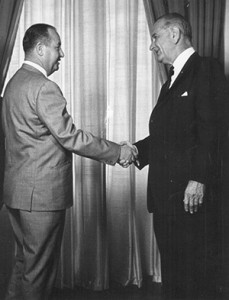Ron Weakley welcomed all comers to IBEW 1245. By the late 1960s the union had gained agreements with many additional private and public sector employers, including Plumas-Sierra Rural Electric Cooperative, City of Healdsburg, City of Redding, Truckee Donner Public Utility District, Standard Pacific Gas Line, California-Pacific Utilities (Needles Division), which later became part of Frontier.

Business Manager Ronald Weakley understood the importance of building relationships with elected officials. Here he meets with President Lyndon B. Johnson. IBEW 1245 Archive
The union organized technicians on the new Bay Area Rapid Transit system (BART), and continued to represent transit workers from the old Key system after it was transformed into Alameda-Contra Costa Transit District. The union organized cable television companies in Merced, Healdsburg, and the East Bay. Weakley even organized Navy personnel at Oakland Naval Hospital and the Naval Air Station in Alameda, much to the annoyance of the presiding admiral.
Weakley believed that IBEW’s International officers felt threatened by his success. In any case, they frequently removed newly-organized properties from Local 1245’s jurisdiction.
In 1968 IBEW 1245 helped pass the Meyers-Milias-Brown Act, which greatly strengthened the rights of public employees to engage in collective bargaining.
Weakley would later boast, with some justification, that he had created “the most democratic structure in the labor movement.” Under the union’s unique by-laws, Weakley established democratically-elected officers, Executive Board members, Policy Committee members, and local unit officers.
The Policy Committee, later renamed the Advisory Council, was Weakley’s pride and joy. It not only gave these elected representatives a direct voice in policy matters, it provided a forum where members could learn about each other’s issues and benefit from each other’s experiences. The Advisory Council was a way to make Local 1245 not just a collection of union members from different employers but a single industrial union—united in its purpose and in its impact on the world.
In 1971, after securing a union shop in bargaining with PG&E, Weakley resigned to take a job at the U.S. Department of Labor. On Weakley’s recommendation, the Executive Board elected his top assistant, L. L. Mitchell, to succeed him.